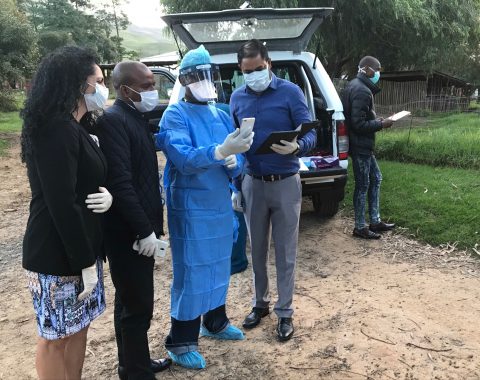African Leader
Analysing The Local Government Leadership Landscape
That the ANC’s recent electoral decline below 50 per cent tells of an impending loss in the 2024 national election has deservedly attracted extensive analysis.
Equally noteworthy though are new activities the organisation initiated as part of its nomination process. A newly established Electoral Commission, chaired by former deputy president of the party and the third president of the republic, Kgalema Motlanthe, steered the nomination process. Candidates for the mayoral positions were interviewed by a panel that included individuals familiar with the technical intricacies of running local government. While showing a party that is possibly changing, these new initiatives are also instructive of what it takes for a party to initiate change. However, it is doubtful whether these initiatives are sustainable for a considerable period into the future.
Motlanthe’s Electoral Commission represents a notable shift. Previously, the nomination process had not received dedicated and impartial attention. It was part of many functions undertaken within the secretary general office (SGO) and only received attention as and when elections approached. The SGO, in turn, relied on its provincial and regional counterparts to oversee processes at the local level. This operational format exposed nominations to bias and manipulation. Both provincial and regional leaders are not uninterested parties in the process, they tended to rig processes in favour of their candidates, some of whom were incumbents that had proven hopelessly incompetent during their tenure.
Manipulation and rigging
Public participation was then introduced, just ahead of the 2011 local election, to neutralise internal party manipulation. Although the party was still allowed to run its selection process, the selected candidates were subjected to public examination in their respective wards. Since residents were most familiar with the candidates, the idea was that they would choose the best candidate based either on previous performance or reputation and encounters in the community. Besides seeking to inject fairness into the selection process, involving residents was also a test of how each candidate resonated with the general electorate, who would ultimately decide who got elected.
Not much changed, however. Rigging continued to happen. Candidates, or their faction, made sure that attendance at public participation sessions favoured them or their candidates. Meetings started at a different time to the one communicated earlier. Some residents would be locked out, or the screening committee would simply forward a different name to the one endorsed by residents. The extraordinary level of fraud even triggered widespread protests in the various wards throughout the country.
This prompted the party to institute an investigation led by Nkosazana Dlamini-Zuma. The findings of the task team confirmed widespread rigging. Competent candidates endorsed by residents were disqualified based on disability. Some were nominated for wards in which they were not resident – a clear violation of guidelines. Others were disqualified purely based on rumours that they were ‘Cope-moles’ in the ANC.
Dlamini-Zuma’s findings stressed the importance of an independent body to oversee the nomination process. That need had been realised a long time ago. In June 2005, the party’s National General Council was presented with the proposal to set up an independent body such as the Electoral Committee. The proposal was rejected. Local party elites were intent on keeping national headquarters out of the nomination process. They even overturned Jacob Zuma’s decision, which the National Executive Committee had accepted, to take leave of his duties as deputy president of the party, following his corruption charge. Zuma’s predicament was iconic of what they considered profound pain – accounting for their conduct to the national office.
Sense prevailed, somewhat, at the 2007 national conference. The proposal to set up an Electoral Committee was adopted. Even then, it would take 14 more years for the resolution to see the light of day. In the end, it took 16 years from presenting the idea, adopting, and eventually implementing it. In the meantime, the state of local government was deteriorating with every passing year due to the poor selection of councillors.
Educational qualifications versus technical competence
One of the major weaknesses, in addition to the neglect of one’s duties, was lack of “papers” – educational qualifications – to meet the requirements of the position. Councillors, for instance, exercise oversight over officials. This entails more than just “noting” reports presented by officials; it includes understanding the content and asking relevant questions. In 2021, for instance, roughly 70 per cent had not gone beyond matric, while others hadn’t even reached Grade 12. The conduct of most showed that they never cultivated the habit of reading.
It’s only in the 2016 elections that the party woke up to the importance of technical competence. Candidates were required to present CVs. But, even that doesn’t seem to have improved the level of qualifications among their councillors.
The party hasn’t given up entirely on qualifications, albeit it’s applying the criterion unevenly. Now they’re focusing closely on mayoral candidates instead of the whole cohort of councillors. In this previous election, they set up a panel of experts to interview elected councillors. Three candidates were forwarded for interviews. The process was not without the usual shenanigans. Some of the nominated candidates hardly had any matric or post-matric qualifications. In some cases, this was deliberate: the intention was to have only one strong candidate because they wanted that strong candidate appointed. Not that there were no other candidates with comparable qualifications; regional leaders just did not want their favourite candidate to face competition.
For a party that has taken numerous study tours to China, the lacklustre attention to educational qualifications is telling, for example, they’re full of praise for the Communist Party’s prioritisation of technical competence as a prerequisite for public office. However, the ANC’s failure to emulate what it claims to adore shows a horrible lack of desire for innovation and disregard for the damaging impact on society. Leaders place a premium on being elected. This means getting support from whoever offers it. Those leaders, in turn, support the appointment of their “runners” regardless of competence.
Lack of resources and professionalism
The party’s president, Cyril Ramaphosa, continues to make promises of better performance, nonetheless. This will be achieved, he claims, through rigorous and constant monitoring of councillors to ensure they fulfil their duties. It’s hard to see that happening. Technical competence remains a glaring problem. It is also doubtful that the organisation has the capacity for constant monitoring. Regional offices, upon whom this responsibility will fall, suffer from poor administrative capacity. There’s insufficient staff, and some offices can’t even pay for municipal services, resulting in constant power disconnections. The problem of poorly run offices has been around for some time, long before Luthuli House’s nonpayment of staff made headlines. Even the recently formed Electoral Commission suffered from a lack of administrative and logistical support.
Ultimately, the ANC suffers from a fundamental problem of lack of professionalism. The party hasn’t quite appreciated that it needs to professionalise its operations to function optimally. This explains inadequate staffing in the SGO, the office responsible for the administration of the entire organisation.
At some level though, what appears odd to some, may be intentional. The malfunction benefits some of their leaders. Their mischief goes without being noticed by higher structures. When it does turn the corner, the party better hope that the electorate will not have found new suitors among the emerging community organisations and independents. Many had a good showing in this past election, which explains the record number of hung councils. And, the likely poor performance from the party’s councillors will trigger even more alternatives for voters. Time is running out!






 Sign-up and receive the Business Media MAGS newsletter OR SA Mining newsletter straight to your inbox.
Sign-up and receive the Business Media MAGS newsletter OR SA Mining newsletter straight to your inbox.